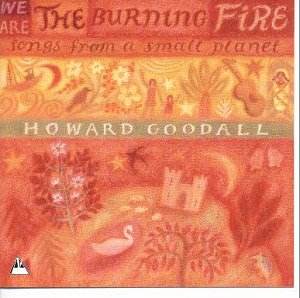Howard GOODALL
We are the Burning Fire:
Songs from a Small Planet
 METRONOME MET CD 1040
[68:38]
METRONOME MET CD 1040
[68:38]
Crotchet
Amazon
UK
Amazon
USA

Howard Goodall, best known as the composer of such TV themes as
Blackadder and Mr. Bean, originally set out to adapt and
record a collection of lullabies culled from around the world. But realising
that this would mean excluding many pieces he felt demanded attention, he
chose instead to simply compile an assortment of general world folk songs.
To start things off, the Bulgarian 'Polegnala e Todora' is operatic and hymn-like
and features both children's and adult choir, supported ably by undulating
piano in a rather nice arrangement. This is followed by very English voices
singing a typically Spanish piece, 'A La Nanita Nana', a rather odd combination
that reminded me of a theatrical show performance.
There's a suite of three African songs; 'Tina Singu' from Lesotho, rhythmic
and jolly, the South African 'Asikhatali', that gets a little lost in the
mix and 'Allundré Allundé', an East African number that's rather
more serious and dramatic.
'Blow the Wind Southerly' from Scotland begins with an incessant weather
forecast that lasts close to two minutes and becomes rather irritating to
say the least. What follows could almost have been lifted straight out of
Braveheart, at least until the very English boy treble solo by Henry Bennett
intrudes.
Seagull calls open Iceland's 'Bium Bium Bamba', but this time it's a brief
device and the track soon transforms into something rather like a sprightly,
nursery rhyme. Unfortunately though it's fairly mundane and forgettable.
'Röslein Röslein' is a typically dour, melancholic German piece,
whose most notable element is its lyrics by the poet Goethe, who also wrote
the classic 'Faust'. By contrast 'Waly, Waly' from England is a pleasant
enough traditional English folk song, although Goodall has added quite a
bit of new music to supplement the original. As one might imagine the treble
solo works to best advantage here.
Two Italian lullabies feature in 'Pecché non Duorme?' from Naples
and 'Dormi, Dormi' from Calabria. Both are slightly operatic (again with
that treble solo) but I found my attention wavering. Perhaps it was simply
a case of the lullabies doing their work too well!
Brazil's 'Tutú Marambá' is light, frothy and lively without
really being very distinctive, while the Polish 'Rosla Kalina' is unequivocally
sorrowful but not particularly affecting. However, the pleasant French song
'Adieu, la Belle' is one of the better songs included here, although it is
still a long way behind what is without question my own personal favourite,
'Kou jou-no-tsuki' from Japan. This fine piece is a truly atmospheric and
imposing song and will win many repeat plays in the future I'm sure.
Finally two songs from Eire conclude the proceedings. It's hard not to like
the pleasing 'The Lark in the Clear Air', which has the same enigmatic charm
that is found in so much of the music from Ireland. 'She Moved Through the
Fair' on the other hand is a telling, doomladen, again distinctly Irish folk
song and while it's hard to dismiss, it does become a little wearing to sit
through.
Although the performances by The Choir of Christ Church Cathedral Oxford
conducted by Stephen Darlington are fine, one of the artistic decisions I
would have to question is the use of treble solo on so many of the pieces.
At times it does provide an interesting contrast to the original ethnic flavour,
but too often detracts from the inherent distinctiveness of the songs themselves.
Sadly, after promising much, I found this collection to be somewhat
disappointing. For me, apart from 'Kou jou-no-tsuki', there's not really
any other song here that merits serious attention. Obviously that is a subjective
opinion and one that is almost inevitable because of the diverse range of
musical influences on offer. Even so, I would have thought a more dynamic
collection could have been assembled. Perhaps it's just a case of what appeals
to Howard Goodall doesn't quite have the same attraction for me.
Mark Hockley

![]()
![]()
![]()
![]()
![]()
![]()
![]()
![]()
![]()
![]()
![]()
![]()
![]()
![]()
![]()
![]()